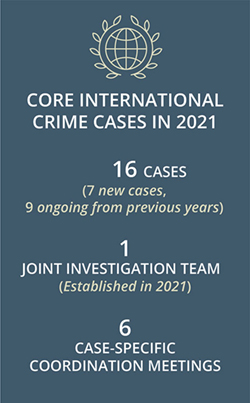
The European Union is strongly committed to the fight against impunity for genocide, crimes against humanity and war crimes. Eurojust and the Genocide Network continue to provide support to prosecutors and judges dealing with these highly complex cases. The Genocide Network Secretariat hosted by Eurojust facilitates cooperation among prosecutors, law enforcement, mutual legal assistance officers and other practitioners across the European Union who specialise in the investigation and prosecution of core international crimes.
Overview of cases by crime type in 2021
16.1. Latest developments
Ten years after the outbreak of the armed conflict in Syria, the Genocide Network dedicated the 6th EU Day Against Impunity on 21 May 2021 to recent results and ongoing actions to hold the Syrian regime accountable for crimes committed in Syria, including for the use of torture and chemical weapons against its civilians. To mark the day, a dedicated video was produced, highlighting different perspectives on the work done by the EU and Member States to ensure accountability.
In addition to European Commissioner Didier Reynders and Eurojust President Ladislav Hamran, victims, prosecutors, national representatives and members of civil society presented challenges and successes of current and future trials in national courts, addressed victims’ expectations, and explained why justice matters. This annual event offers a platform to raise awareness on the most heinous crimes and the importance of Member State-led investigations and prosecutions – in particular against suspects who are present or reside in the European Union – in preventing impunity.
Prosecution of sanctions violations was another key topic addressed by the Genocide Network in 2021. Sanctions, embargos and restrictive measures are political trade restrictions imposed by the United Nations or the European Union. The measures target governments, organised military or paramilitary groups, commercial entities and individuals whose behaviour contravenes international law and present specific threats, such as cyberattacks, proliferation of chemical weapons, terrorism, human rights violations and abuses. Investigating and prosecuting such violations could prove critical in the overall fight against impunity for core international crimes, in particular where corporate actors are involved. Legislation of all EU Member States include administrative or criminal penalties for such violations, though very few individuals or legal persons are effectively held accountable.
On this special day, I want to congratulate the Genocide Network on its excellent work. This shows Eurojust’s role is clearly paying off. Together, we must continue to act and join forces. In the next years, the Commission will reinforce the Agency’s ability to cooperate with new partners in the Middle East. We will continue working on improving cross-border cooperation and ending impunity.
A recent report published by the Genocide Network demonstrates that prosecuting sanctions violations may provide an alternative or additional path towards accountability for core international crimes. It can assist in establishing a link or nexus needed in some countries for core international crimes proceedings to be initiated under the universal or extraterritorial jurisdiction principle. Looking into sanctions violations may also provide preliminary evidence for wider investigations leading to other forms of interlinked criminality, such as terrorism or illegal trade. For these reasons, sanctions monitoring and the adequate penalisation of sanctions violations should be fully integrated into EU Member States and practitioners’ overall strategies to fight against impunity.
In 2021, the Genocide Network continued to contribute to the professional development of judicial practitioners. In March 2021, the Network held a webinar hosted by CEPOL, the European Union Agency for Law Enforcement Training, on the cumulative prosecution of foreign terrorist fighters. The webinar highlighted the possibilities for law enforcement agencies and judicial authorities to investigate and cumulatively prosecute foreign terrorist fighters for core international crimes and terrorism-related offences. Moreover, in June 2021, the Genocide Network Secretariat and EJTN held a joint webinar on the prosecution of core international crime cases in Europe, directed at EU judges and prosecutors. The webinar presented practical issues and evidentiary challenges, highlighting instruments of judicial cooperation available to practitioners. In November 2021, the Genocide Network also published the latest update of its Case Law Compendium including new convictions rendered by EU jurisdictions against foreign terrorist fighters on cumulative charges.
